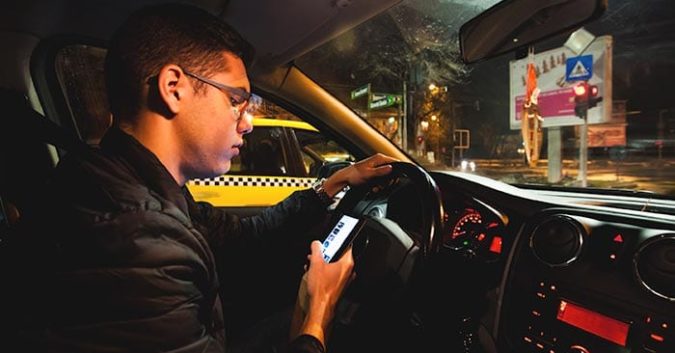At literally any moment of the day, from sunrise to sunset, about 660,000 Americans across the country are driving around with their eyes fixed on the glow of a smartphone screen instead of the road. That's more distracted drivers on the road than there are people living in the entire city of Boston – a whole city’s worth of cars, and all of them potential accidents.
Considering that Americans send nearly 170 billion text messages every single month – well over 500 texts per person – it’s not surprising that the country is, well, distracted. But our love of smart phones and digital devices has gotten dangerously out-of-hand. It’s now a full-blown addiction, and when combined with motor vehicles, it’s an addiction that can be twice as dangerous as drunk driving.
The Numbers Are Scary: Distracted Driving Is a Real Problem
For the last 7 years, state governments and their state and local police departments have tried all forms of public service announcements and ad campaigns to discourage distracted driving, especially texting while driving. But it’s been of no use – Americans are worse than ever about texting from behind the wheel.
It's no wonder then that road deaths spiked by 8 percent in the year between 2014 and 2015. The increase in fatalities is so severe that 2015 was named the deadliest driving year in almost a decade, with over 38,000 recorded traffic deaths and 4.4 million injuries.
But what’s the solution to such a high-tech, uniquely 21st century problem? A high-tech, anti-texting gadget, of course.
There's a New Sheriff in Town: Meet the Textalyzer
Just like it's tried-and-true cousin, the Breathalyzer, the Textalyzer will allow police to peak into a person’s phone, to see if they have been texting while behind the wheel. If the new software is made legal, officers will be able to quickly see when and where drivers are using their phones.
Unlike drunk driving, distracted driving can be very difficult to catch in the act; safety advocates like Dr. Jay Winsten of Harvard University believe the Textalyzer will, “make enforcement [of distracted driving] that much more credible.”
At the moment, the device is being tested in New York – the state that also pioneered the use of the Breathalyzer back in the late 1980s. And the device isn’t the only thing that’s new. The New York Senate is trying to pass a bill that would give police the right to demand that citizens hand over their cell phones during routine traffic stops. Currently, drivers who refuse to take a Breathalyzer test can have their licenses suspended – it is proposed that this same penalty would be levied against drivers who refused to take the Textalyzer under the new law.
Really, New York is just strengthening its already strict laws. Drivers can already receive a 4-month suspension for using their phones (if caught) while driving and can lose their license for a full year if they commit a second offense. The Textalyzer would make it easier to catch more offenders and, hopefully, discourage drivers from doing the reckless act.
As it stands, the ultimate goal of New York lawmakers is to make distracted driving as severe an offense as drunk driving.
New Laws for a New Generation
Safety advocates like Deborah Hersman, president of the National Safety Council (NSC), see drunk driving and distracted driving as 2 sides of the same coin. Hersman asked the New York Times, "why are we making a distinction between a substance you consume and one that consumes you?" She makes a valid point. Even though cell phones don’t kill brain cells, they can be so addicting to some people that deadly, thoughtless decisions are made in an instant.
Opponents of the new Textalyzer laws are worried, of course, about privacy issues. Donna Lieberman of the American Civil Liberties Union (ACLU) believes the new laws, "really [invite] police to seize phones without justification or warrant." So far, the manufacturer of the Textalyzer, Cellebrite USA, has said that it should be easy to create a device that monitors cell phone use without letting officers actually see the content of text messages.
The balance between the need for safety and the right to privacy has been one of the defining issues of the digital age. In the case of distracted driving, it’s a question of the lesser of 2 evils. Are Americans willing to hand over their cell phones now and then if it means saving tens of thousands of lives a year? Or do these laws give police officers too much power and the ability to spy on the very people they supposed to protect?
For now, we are all to wait and see.
